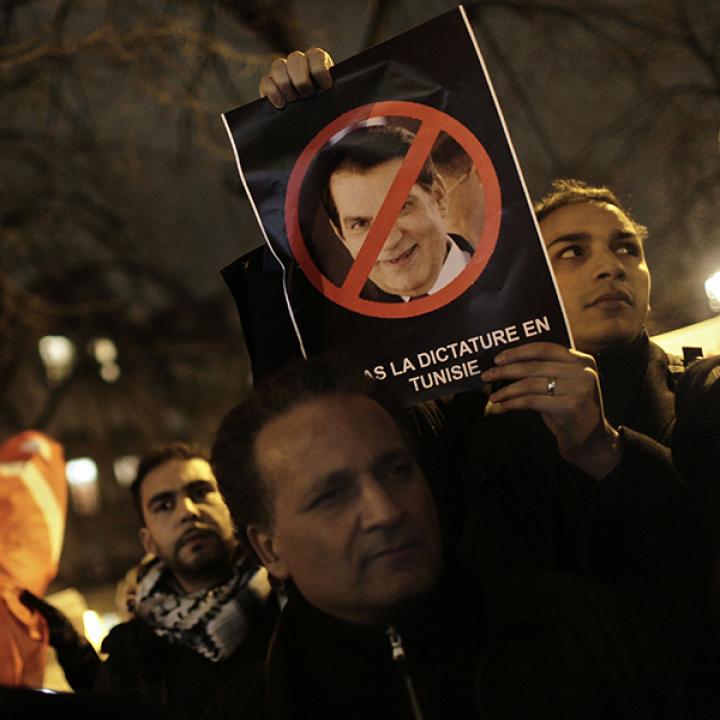

Unless Western countries provide assistance, the recent violence could unravel the government's progress in stemming terrorist activity.
The recent, shocking attack in the Mount Chaambi region of Tunisia left fourteen soldiers dead and twenty others injured. The most deadly incident for the Tunisian army since the 1950s, the attack occurred in the wake of significant security improvements, suggesting that the country's struggle to eliminate terrorist threats is far from over and will require international, and especially Western, assistance to succeed.
Following the establishment of a technocratic government late last year, Tunisian prime minister Mehdi Jomaa announced in his inauguration speech that his priorities for Tunisia were "security, economy, and social development." His prioritization of security was expected; the new cabinet was a testament to Islamist political party Ennahda's failure to prevent the assassination of two prominent opposition figures in 2013. As a result of the lack of security countrywide in 2013, Ennahda was forced to step down.
From Jomaa's perspective, last year's failures were the collective responsibility of the government, and it is not surprising that Lotfi Ben Jeddou, the interior minister in the Ennahda-led government, kept his job despite strong opposition from secular parties. Keeping Ben Jeddou and his team in the government was meant to signal continuity as the cabinet implemented a new security agenda, which includes creating a counterterrorism center meant "to harmonize and coordinate the actions of different stakeholders" and an NSA-like agency that specializes in monitoring telecommunications. Such initiatives have facilitated better coordination between Tunisian counterterrorism forces and the military.
Tunisian authorities have also stepped up efforts to track Tunisian jihadists leaving to fight in Syria. According to Interior Ministry estimates, eight thousand jihadists have been prevented from leaving the country and six jihadist networks that recruit and transport young men to Syria have been dismantled. Moreover, there has been increased cooperation with Libya and Algeria as they have similar concerns about the rise of terrorism. In his first trip abroad in February 2014, Jomaa visited Algeria and agreed to establish a joint military surveillance system along the border between the two countries. Similarly, there has been increased coordination with Libya to shore up the buffer zone.
These new policies have yielded successes. For example, this past February government forces killed seven suspected terrorists, including Kamel Gadhgadhi, the alleged assassin of leftist leader Chokri Belaid. The government also arrested Ahmed al-Malki, the prime suspect in the assassination of opposition leader Mohamed Brahmi; foiled several border crossing attempts; and seized large quantities of weapons. The Tunisian public responded positively to these achievements, which were cited as proof of the efficacy of the government's new policies. Even U.S. Secretary of State John Kerry, in a visit to Tunisia last February, applauded "the very significant arrests that were made and the breakup of [terrorist group] Ansar al-Sharia's cells."
Still, as the recent attack in Mount Chaambi makes clear, this is no time for complacency. Terrorism in Tunisia has already moved from urban to more remote areas, especially bordering Algeria and Libya. Terrorist cells have even reportedly established networks in Libya that could provide them with new safe havens and open up new channels for funding and weapons. Al-Qaeda in the Islamic Maghreb, emboldened by the success of the Islamic State in Iraq and al-Sham, which recently changed its name to the Islamic State, is now primed to exploit the lawlessness and violence in Libya, where it could likely find operational, financial, and logistical support. Given these conditions, international cooperation and Western support is imperative. The recent meeting of Libya's neighbors in Tunis on July 13-14 to outline a containment strategy for the country is the right first step. However, the efficacy of its implementation requires strong American and European support.
Mohamed Bechri is former director of the Tunisian section of Amnesty International. This article was originally published on Fikra Forum.
Fikra Forum


